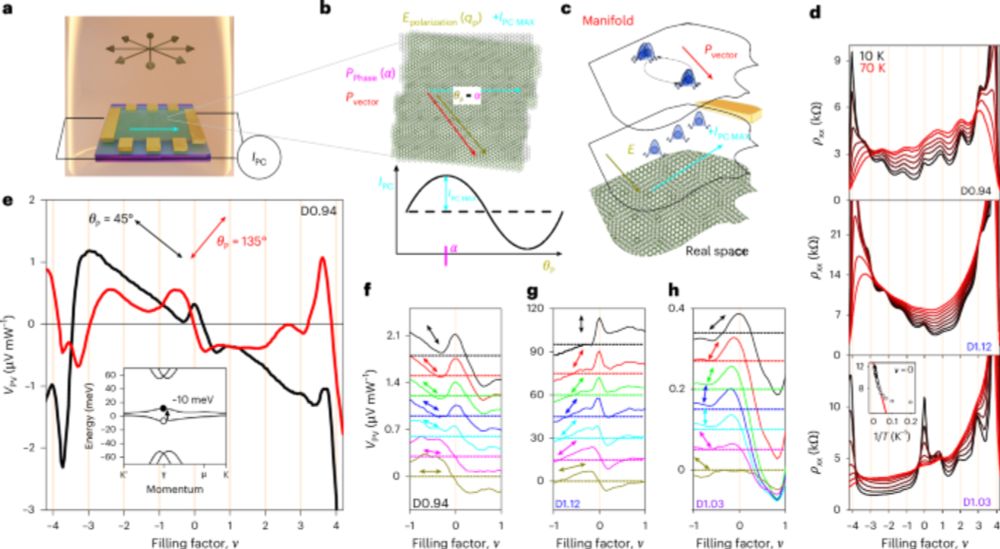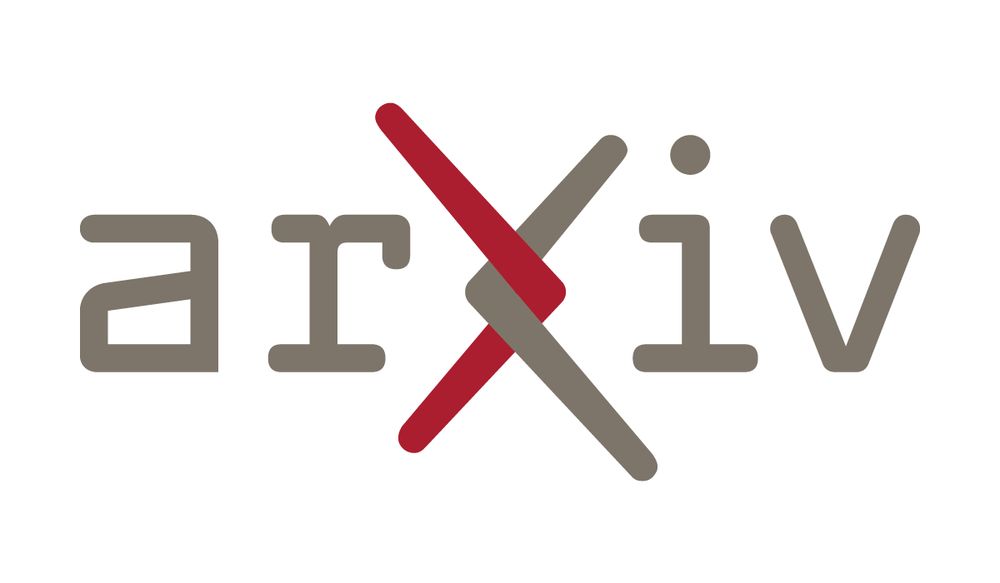congrats to the team @icfo.eu!
01.04.2025 19:59 — 👍 2 🔁 0 💬 0 📌 0

In the next edition of #CondensedMatterPioneers we would like to highlight the career of Pierre-Gilles de Gennes (1932-2007), a French physicist renowned for his extensive contributions to condensed matter physics, particularly in the study of soft matter.🧵
23.02.2025 18:12 — 👍 7 🔁 6 💬 1 📌 0
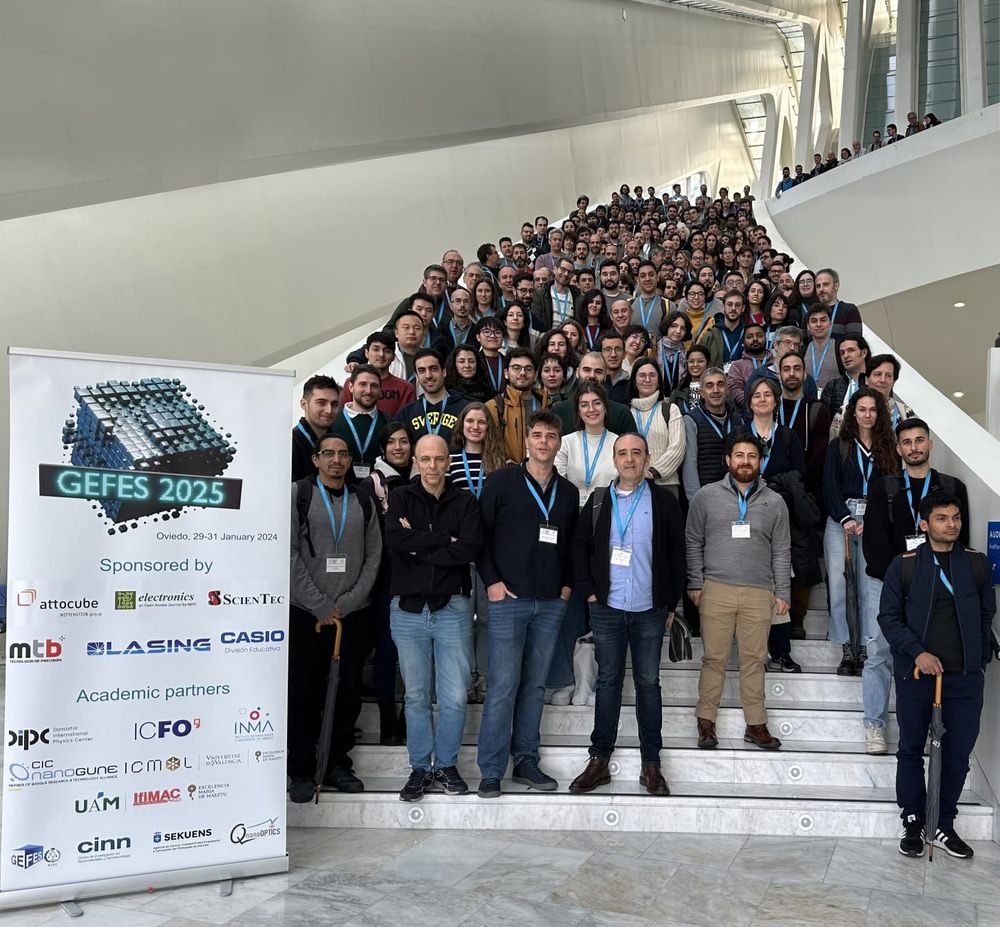
#GEFES2025 group picture 🤗
After a self-assembly process, we managed to fit altogether 😅
30.01.2025 14:49 — 👍 6 🔁 3 💬 0 📌 0
Thanks @pablerasares.bsky.social for the picture!
30.01.2025 17:33 — 👍 2 🔁 0 💬 0 📌 0
The second invited talk of today's afternoon session at #GEFES2025 will be given by Julien Barrier at 5.40 pm
@julienbarrier.eu
30.01.2025 15:55 — 👍 3 🔁 1 💬 1 📌 0
Second day at @gefes-rsef.bsky.social, Carlos Antón Solanas @uam.es @ifimacuam.bsky.social talks about single photon emission and quantum photonic devices with 2D materials
30.01.2025 11:28 — 👍 3 🔁 0 💬 0 📌 0
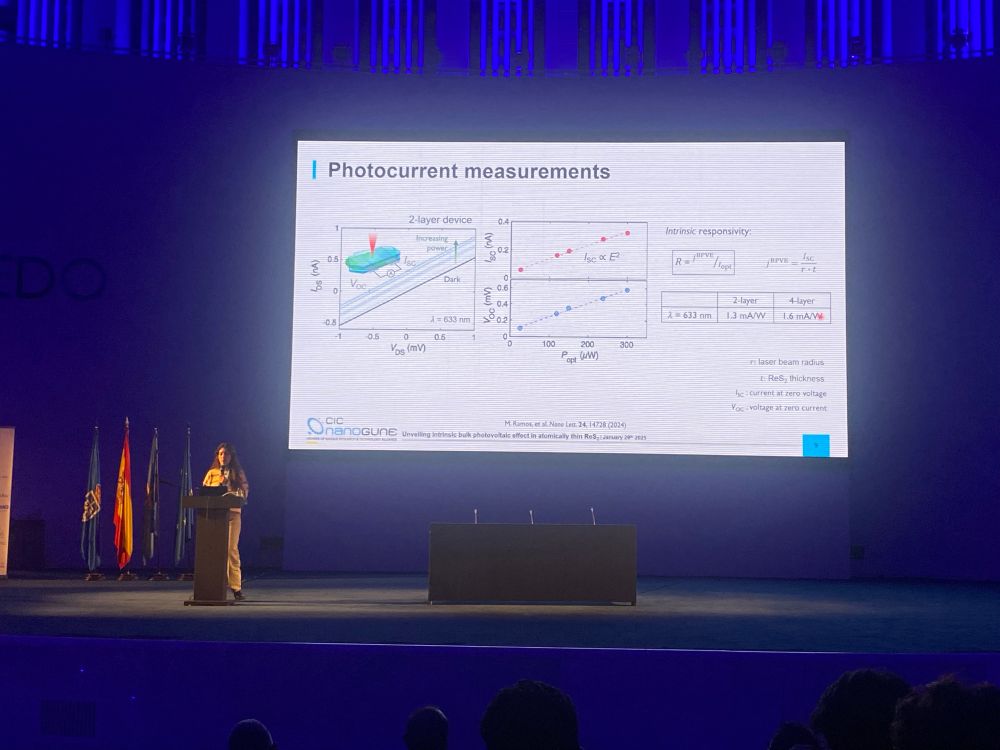
María Ramos Vázquez @nanogune.bsky.social wraps up the first day @gefes-rsef.bsky.social with bulk photovoltaic effect measured in atomically thin ReS2
29.01.2025 18:21 — 👍 3 🔁 0 💬 0 📌 0
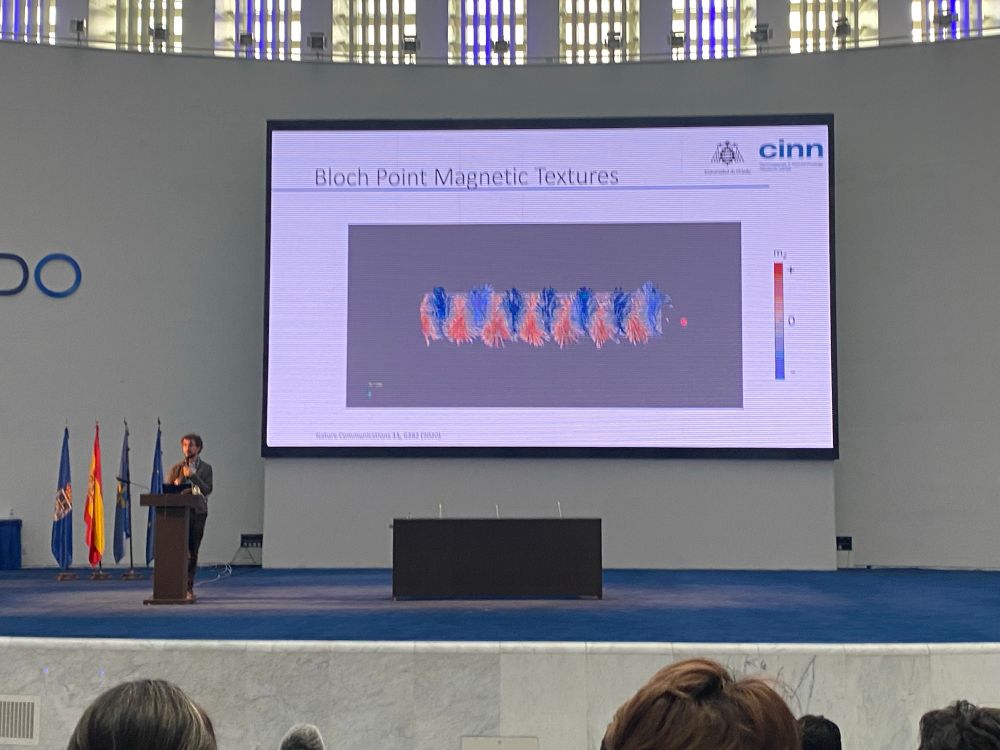
Aurelio Hierro Rodriguez (Uni Oviedo) presents magnetic tomography, showing direct mapping of Bloch points and vertices in 3D at @gefes-rsef.bsky.social
29.01.2025 14:55 — 👍 3 🔁 0 💬 0 📌 0
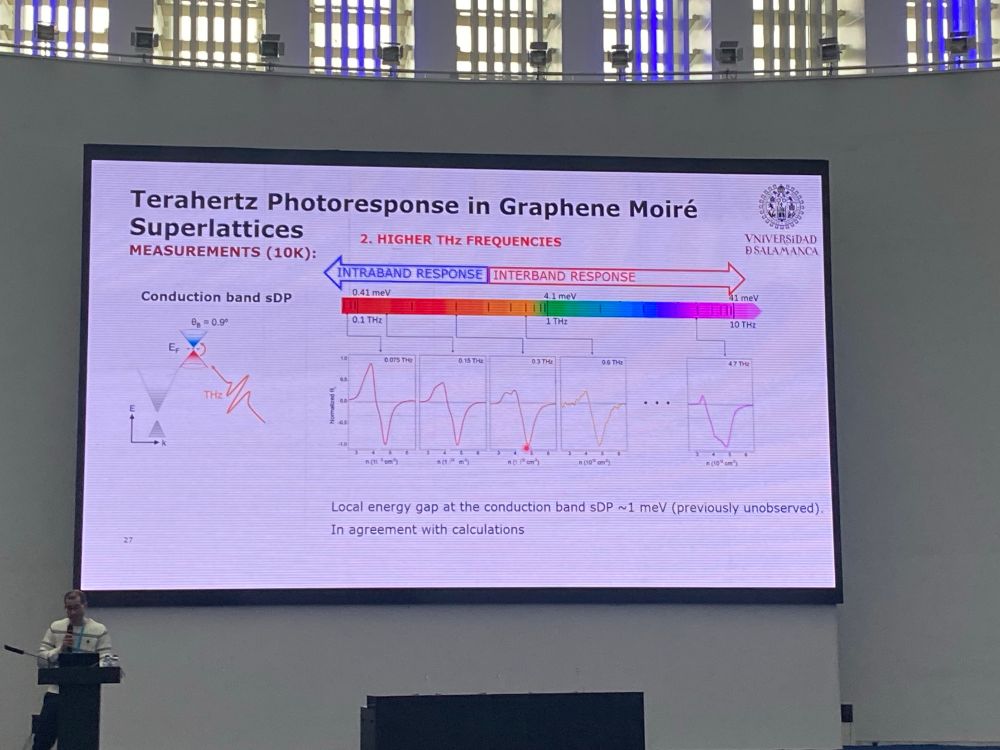
Great talk from Jose Caridad @usaloficial.bsky.social on THz photoresponse in graphene superlattices, resolving local gaps using photocurrent measurements. @gefes-rsef.bsky.social
29.01.2025 11:24 — 👍 3 🔁 0 💬 0 📌 0
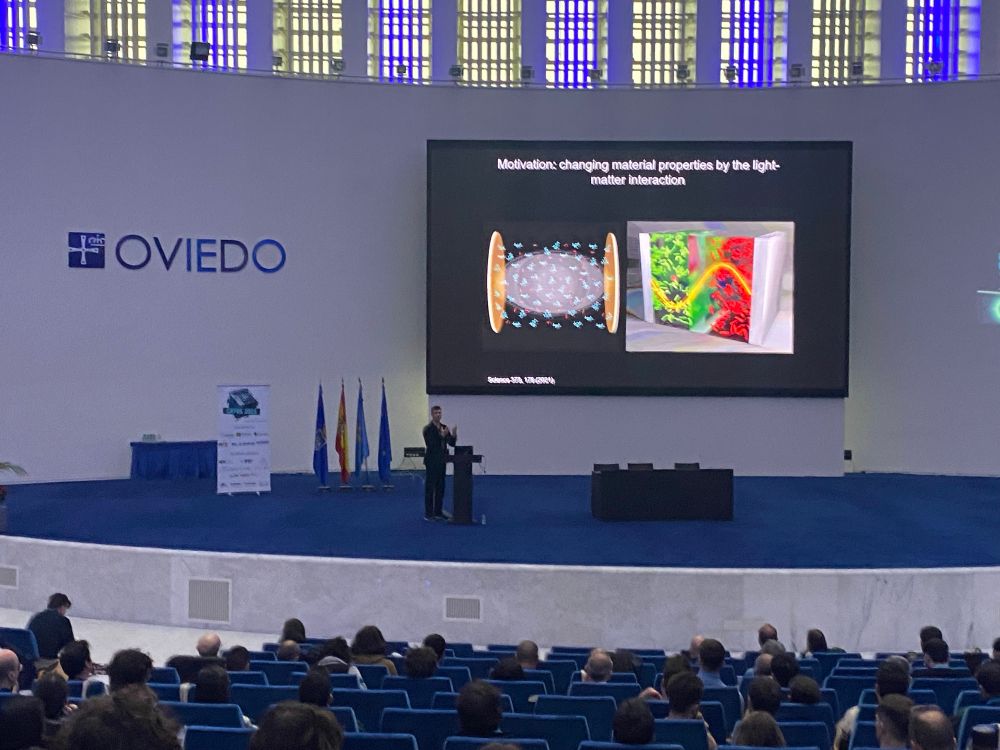
Very didactic talk by Alexey Nikitin @dipcehu.bsky.social on recent progresses in hyperbolic phonon polaritons @gefes-rsef.bsky.social
29.01.2025 09:45 — 👍 3 🔁 0 💬 0 📌 0
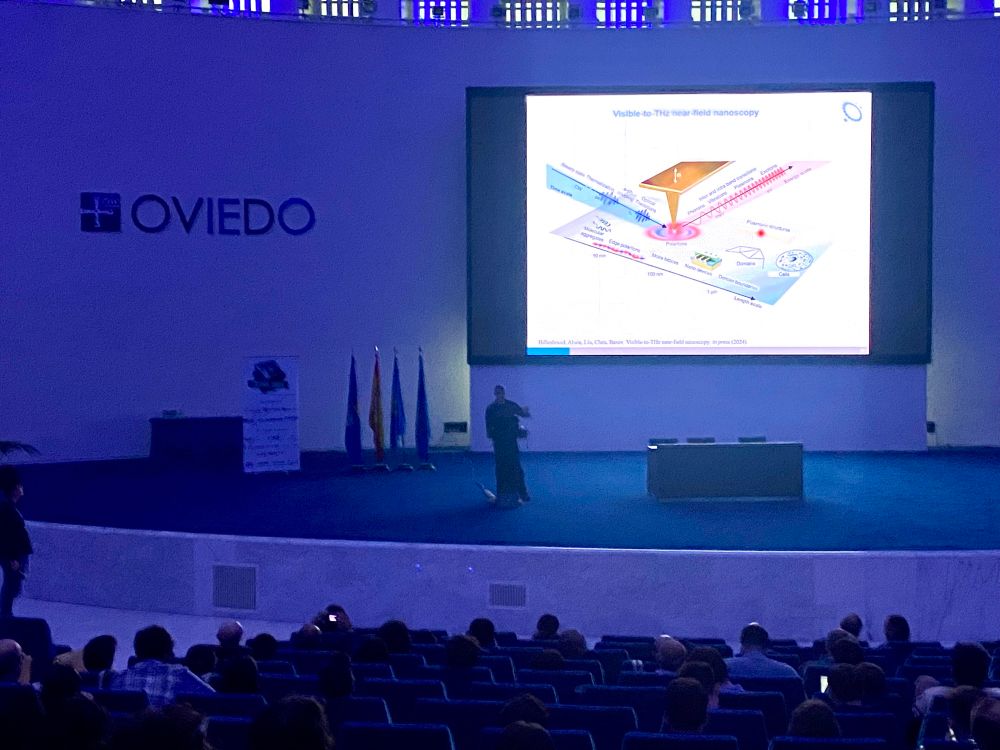
Great start of the GEFES meeting @gefes-rsef.bsky.social with an extensive review of near-field optical microscopy and spectroscopy texhniques by Rainer Hillenbrand @nanogune.bsky.social
29.01.2025 09:16 — 👍 5 🔁 1 💬 0 📌 0
I’m excited to be invited to the GEFES meeting (Condensed Matter Physics group of the Royal Society of Spain). I’ll be sharing my work on Coulomb screening in twisted graphene on Thursday afternoon, and I’m looking forward to catch up with everyone
27.01.2025 11:40 — 👍 1 🔁 0 💬 0 📌 0
I agree it’s important; in general, I find this information suitable for supplemental materials
13.01.2025 11:18 — 👍 2 🔁 0 💬 1 📌 0
The earlier your paper is online, the earlier people can think about it and build on the science.
As early career researcher, you may want to be able to prove that the paper you list on your CV is not only "in preparation" but you deem it good enough to be shared, and others can make their own mind
13.01.2025 10:28 — 👍 2 🔁 0 💬 0 📌 0
In my opinion, the best is right after submission, when sent to review. Some do it a week before to gather advice (e.g. ppl might contact you about missing references). Others do it after the first referee reply, so that they don’t post something "wrong" online. Others only after it’s accepted
13.01.2025 10:28 — 👍 2 🔁 0 💬 1 📌 0
It’s important to remember that papers are written for other scientists, not for the general public. In that sense, everyone knows (or should know) how it’s done. That being said, you can talk about the development in blog posts, or when delivering a talk, and even post it on Youtube
13.01.2025 10:16 — 👍 1 🔁 0 💬 1 📌 0
When someone writes "we tried to do X, we did it that way", you should read "if I want to reproduce X, I can do it that way". In the interest of brevity it is usually not possible to write down the "historic" development, but we usually get some of it by reading theses.
13.01.2025 10:14 — 👍 1 🔁 0 💬 0 📌 0
avec Arkema oui mais au CEA Liten à Technolac, dans le laboratoire de photovoltaïque organique/perovskite
29.12.2024 11:58 — 👍 1 🔁 0 💬 1 📌 0
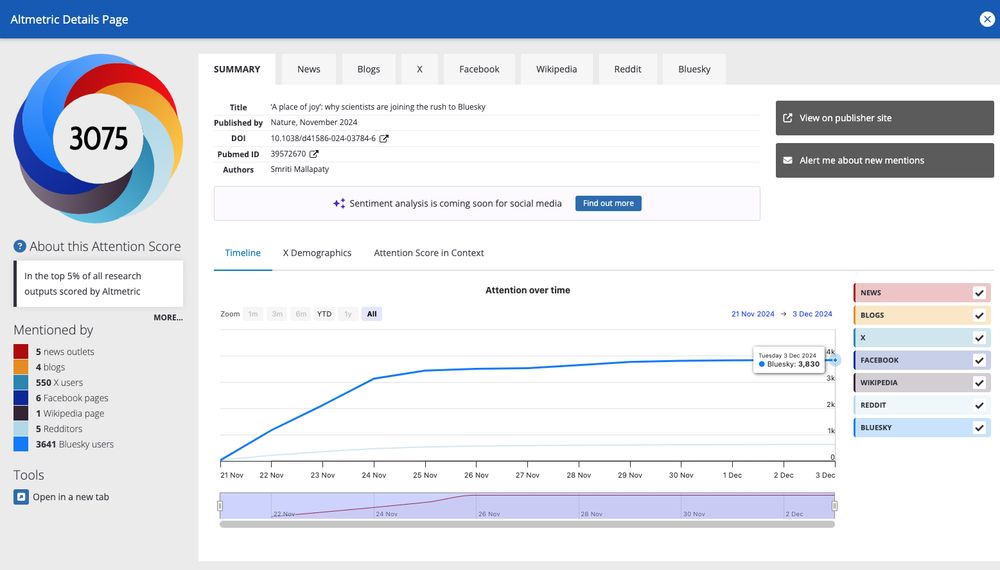
‘A place of joy’: why scientists are joining the rush to Bluesky
Researchers say the social-media platform — an alternative to X — offers more control over the content they see and the people they engage with.: https://www.nature.com/articles/d41586-024-03784-6
There are already many articles for which there is more attention on Bluesky than on other comparable micro-blogging sites, meaning the academic community and the general public have clearly adopted Bluesky as one of its core places to disseminate and discuss new research.
A Place of Joy.
03.12.2024 14:00 — 👍 2534 🔁 676 💬 49 📌 103
We found that, by increasing screening, superconductivity was suppressed, which points towards an unconventional pairing mechanism for the superconductivity in magic-angle twisted bilayer graphene
03.12.2024 06:22 — 👍 0 🔁 0 💬 1 📌 0
So what? We applied this to magic-angle graphene, where the role of Coulomb interactions has remained highly debated. This is an important question since it can resolve the nature of the superconductivity in the system
03.12.2024 06:22 — 👍 0 🔁 0 💬 1 📌 0
In addition, we showed that minimally twisted bilayer graphene allows for tuneable screening by varying its electron density. Overall we screened Coulomb interactions 50 times better than previous systems based on bilayer graphene
03.12.2024 06:22 — 👍 0 🔁 0 💬 1 📌 0
Here we showed that a large twist angle between two graphene systems can electronically decouple the layers while maintaining an interlayer distance =0.3nm. Small distance with a metal is a requirement for strong screening of Coulomb interactions
03.12.2024 06:22 — 👍 0 🔁 0 💬 1 📌 0
C’est typiquement ce qui se fait dans les universités outre-manche… Celui/celle qui rapporte peu va se faire charger d’enseignement au point de ne plus pouvoir faire de recherche. Certaines bourses existent même pour couvrir le recrutement d’enseignants à la place de l’EC pendant une période donnée…
26.11.2024 14:57 — 👍 0 🔁 0 💬 0 📌 0
pas sûr que ce soir une singularité : pas d’enseignement aux Max Planck en Allemagne, CSIC en Espagne, CSIRO en Australie, CAS en Chine. Ce n’est pas la norme mais ça existe ailleurs. Et même si c’était une singularité, je ne vois pas en quoi cela justifierait de la supprimer
26.11.2024 13:16 — 👍 8 🔁 0 💬 2 📌 0
Prof. Dorothy Bishop has resigned from the Royal Society over Elon Musk's fellowship. Women make up only around 12% of Royal Society fellows, and now they have lost a good one for the sake of keeping a man who is responsible for widely spreading misinformation about science.
25.11.2024 16:43 — 👍 53 🔁 31 💬 2 📌 2
Quantum Scientist at JQI & QuICS
schuckert.org
Group Leader of the Bio-Engineered Nanophotonics team at IMDEA nanoscience in Madrid (ES)! We combine molecular biology and spectroscopy to engineer photoactive biohybrids (proteins and chromophores). Our web page www.sarahmejias.com
Physicist at Instituto de Física Fundamental (CSIC). Non-equilibrium quantum physics and topological systems.
IKERBASQUE Associate Professor @dipcehu.bsky.social. Theoretical physicist, father of two, passionate about science and technology. Socialist soul. Group leader @MEPS.
Exploring novel chemical and physical properties of atomic-scale structures on surfaces | STM/AFM/Theory | P.I. Pavel Jelínek | Prague, Czech Republic
https://nanosurf.fzu.cz/
Physicist, emerging optoelectronic devices 🔬🌞♻️ Ramón y Cajal fellow
@fisicaus.bsky.social leading @SMSLab.bsky.social.
Institute for research on #nanoscience of Comunidad de Madrid. Severo Ochoa Excellence.
🔬 https://nanociencia.imdea.org/
#IMDEAnanoPublications #IMDEAnanoSeminars #NanocienciaParaTodos #nanociencia
Visualizing Energy Transport at the Photonic Nanomaterials and Devices Lab - Condensed Matter Physics Center (IFIMAC), Universidad Autonoma de Madrid (UAM). ERC #EnVision project.
Setting up the university-wide UAM Climate Course.
www.ferryprinslab.com
Quantum scientist, enthusiastic communicator
Associate professor (PPL) at UAM/IFIMAC
https://members.ifimac.uam.es/lindazotti/
Scientist, professor of quantum physics at Freie Universität Berlin and affiliated with Helmholtz Center Berlin and the Fraunhofer Heinrich Hertz Institute. ERC Fellow.
At KITP on the UC Santa Barbara campus, researchers in theoretical physics and allied fields collaborate on questions at the leading edges of science.
www.kitp.ucsb.edu
European Research Council, set up by the EU, funds top researchers of any nationality, helping them pursue great ideas at the frontiers of knowledge. #HorizonEU
A group of ≈500 scientists, students, and staff, studying the physics and chemistry of condensed matter, ranging from lithium batteries to quantum technologies.
Soft matterist with predilection for biopolymers
Ramón y Cajal Fellow
IFIMAC, Universidad Autónoma de Madrid
www.salvatoreassenza.com
